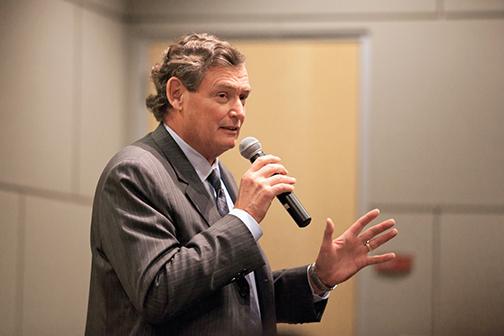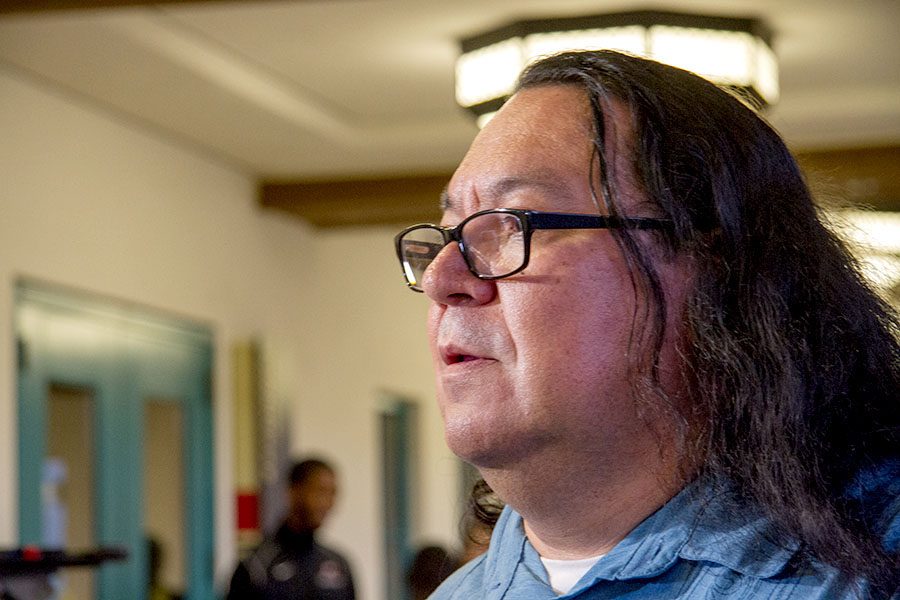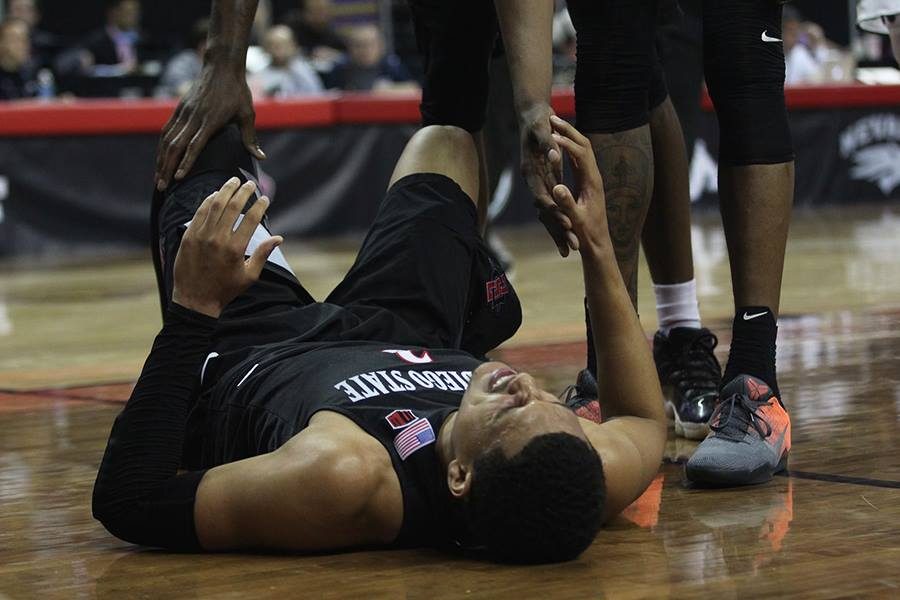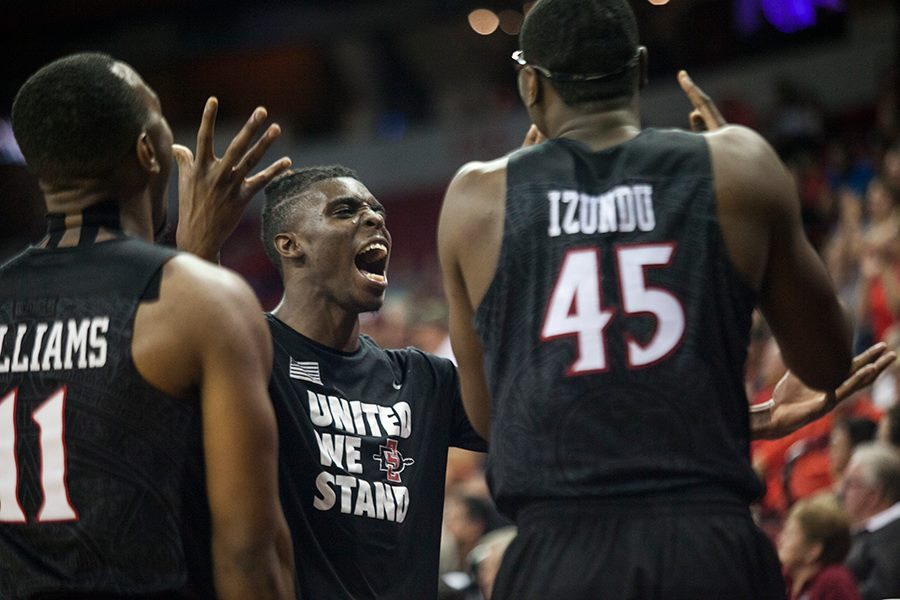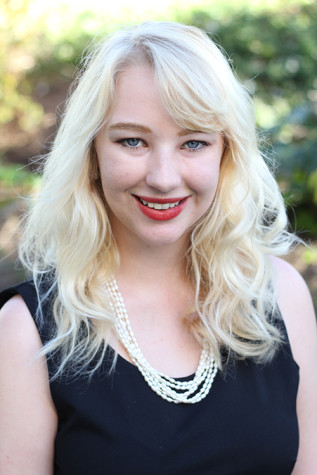California State University Chancellor Tim White spoke at San Diego State on Wednesday afternoon, March 2, to participate in a public university forum, as part of his annual “listening tour” of all 23 CSU campuses. Students, faculty, campus administrators, California Faculty Association protesters — and even two people dressed as a dog and pony — flooded Montezuma Hall at the Conrad Prebys Aztec Student Union.
In his opening remarks, White discussed perhaps the biggest challenge facing the CSU system — that by 2030, California will be 1 million college degrees short of what’s needed to maintain California’s economy.
“The CSU produces almost one half of the (college) degrees in California every year,” White said. “We need half a million more degrees between now and 2030.”
White explained the CSU system would accomplish this by focusing on two main partners: the state of California and primary education and community colleges.
“Instead of consistently underfunding the universities, (California) needs to recognize this is our future and give us sustainable funding,” he said.
White concluded his opening remarks with a few “touchstones” he’s committed to in the CSU system, which he identified as diversity, sustainability and innovation.
The chancellor summarized his leadership style simply: “I’m very clear on the goals, but loose on the means. The way you do it in San Diego might be different than way they in (San Francisco State) do it. My approach to being your chancellor is to try to enable and facilitate success on the campuses, be clear on the needs that affect California’s future but be loose on the means.”
The forum then moved into a question-and-answer portion, where members of the audience were invited to ask the chancellor any question on any topic.
International studies and conflict resolution freshman Nick Elliot read a prepared statement on behalf of Associated Students and asked what White was proud of accomplishing as chancellor.
Not long into White’s response, members of the audience started to interrupt him.
A heckler from the audience yelled, “Hirshman doesn’t care about students!”
White then attempted to explain how “committed” President Elliot Hirshman is to hiring diverse faculty and providing financial aid for students.
Members of the audience quickly started chiming in, “Next question! Next question!”
Career Services counselor Chris Turntine then asked about a college degree’s return on investment for graduating students and their families.
Before White could answer, another student interrupted to read aloud a statement prepared by SDSU Forward. The student claimed the statement was part of Turnstine’s question and while White attempted to address the statement, more students began to speak.
“It was definitely cool,” sociology junior Raymon Camitan said. “We got the guy stumbling over his words. Everything he has is scripted and he’s heard it all so it was impressive to see the students get him to stumble over his words.”
A group of students proceeded to read a list of 20 demands, which included calls to remove the Aztec mascot, establish an on-campus food pantry and grant the 5-percent salary hike for faculty.
“There was something in that list of 20 for everyone,” White said later to The Daily Aztec. “There was something for the president to think about, the student leadership and the academic senate to think about — but every one of them costs money and the harsh reality is if a state doesn’t provide the resources, the resources have to come from some other (place). I hope it spurs more in-depth conversations about all these moving parts. If that’s the end result, then it was worthwhile.”
Hirshman said all of the issues mentioned on the list were issues that he was already familiar with and many were already being researched or had recently been voted upon by the student body.
“At San Diego State, we have a very long history — 50 years — of protests and activism,” Hirshman said.
White said he knows where all the emotions motivating his hecklers comes from.
“I understand the anger and the fear, particularly with part-time employees, that they can’t make ends meet,” White said. “What I can do, though, is re-emphasize the importance of what we are able to negotiate in Sacramento and bring that back to the campuses.”
The audience asked questions on themes such as diversity, faculty salaries and community inclusion. The frustration of the students and faculty in Montezuma Hall was palpable.
“I think the event, or a lot of events like this, are really geared toward allowing the people with the grievances to sort of vent their issues,” Africana Studies assistant professor Antwanisha Alameed-Shauers said. “For me, it allowed the students and the faculty members to vocalize their issues and even their frustrations, but I’m not sure if these types of events are actually efficient in regards to getting something done.”
While listening to the grievances and concerns from the SDSU community, White did his best to focus on the long-term challenges of the CSU system and the reports he has facilitated to better address issues such as student poverty and faculty diversity.
Despite the hostility toward White, he praised SDSU as a flagship university, not only among the CSU campuses, but nationally.
He identified SDSU’s commitment to raising graduation rates, integrated research in the learning environment and alumni’s philanthropy toward the university as three key components that allow students to thrive and push SDSU into excellence, despite the difficulties with the state.
“(SDSU) is one of our most prominent national campuses, one of the biggest research and creative portfolios than any campus and that is both by design and the fortune of being in San Diego with all its opportunities,” White said.
Staff Writer Kayla Jimenez contributed to this story.




